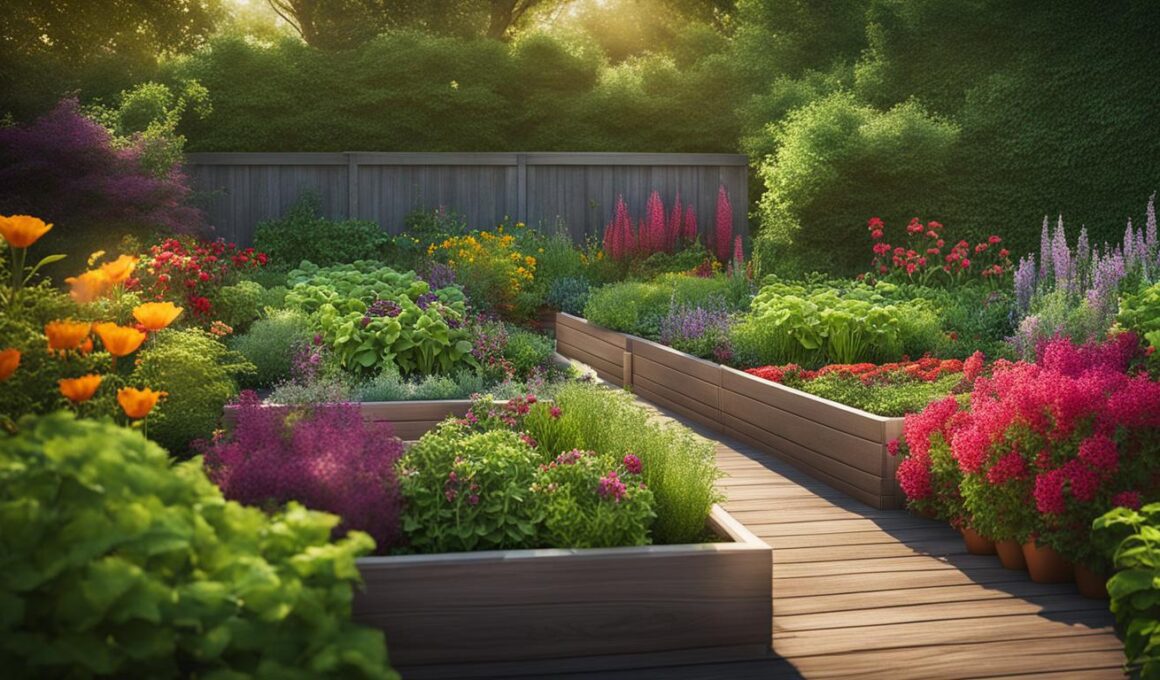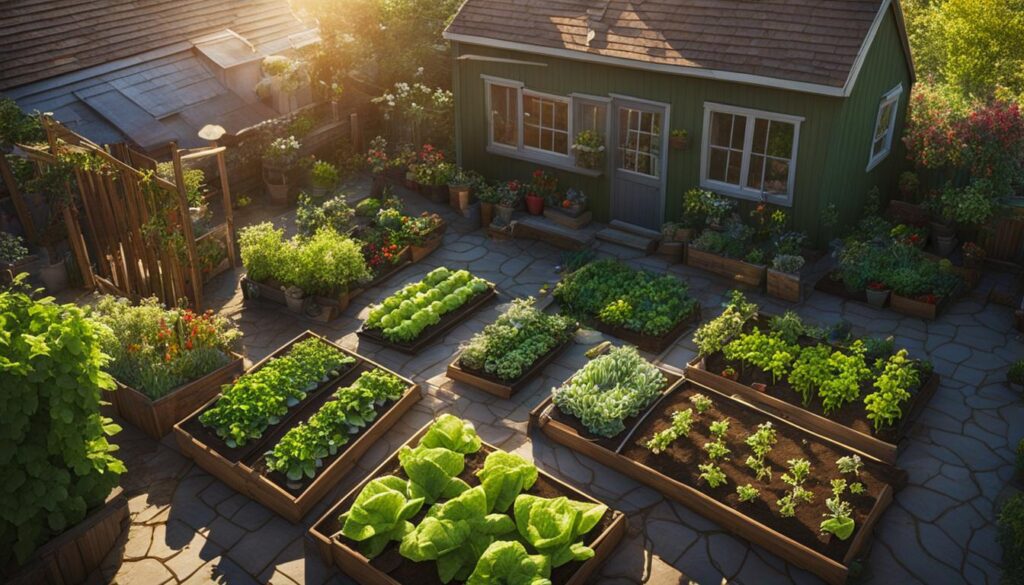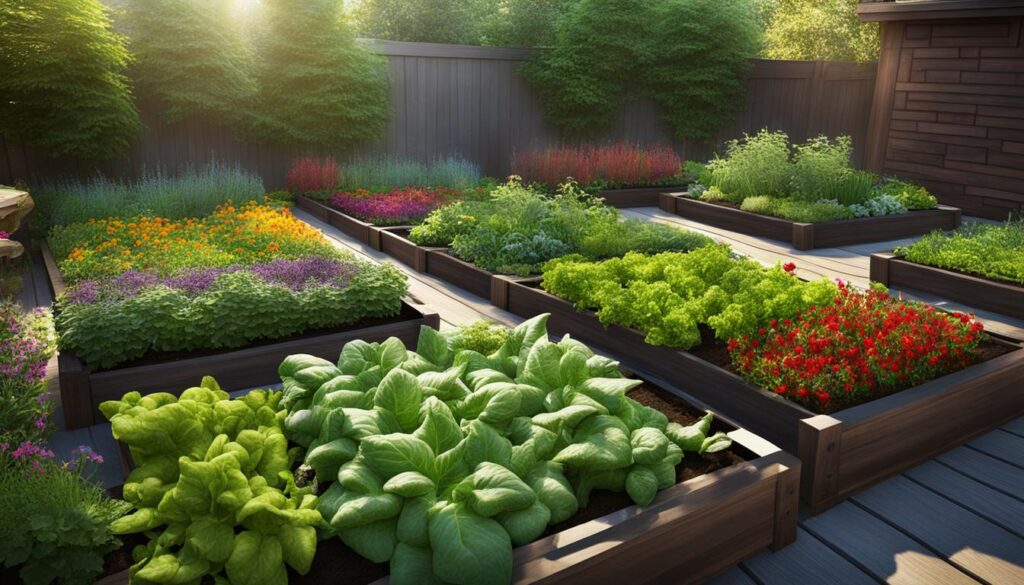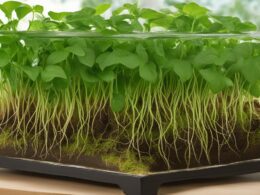Are you interested in taking your gardening to new heights? If so, consider the benefits of raised garden beds. These innovative gardening structures offer a host of advantages that can enhance your gardening experience and yield bountiful results.
Post Summary
- Improved soil quality for optimal plant growth
- Better control over plant growth and spacing
- Higher yields in a smaller space
- Easier maintenance and weed control
- The ability to grow in limited spaces
What is Raised Bed Gardening?
Raised bed gardening is a popular method of gardening where the soil is elevated above ground level. This above-ground approach offers numerous advantages for gardeners, providing better control over the soil quality and creating an ideal environment for plant growth. With raised bed gardening, you can easily adjust the nutrients, aeration, and drainage of the soil, ensuring optimal conditions for your plants.
Raised bed gardening is particularly well-suited for small-scale gardening and intensive planting. By elevating the soil, you eliminate the need for walking paths within the garden beds, maximizing the available growing space. This makes raised bed gardening ideal for urban gardens, balconies, or any small area where space is limited.
The method of raised bed gardening can be implemented using various materials, including wood, bricks, or concrete blocks. By choosing the right materials, you can create a visually appealing garden that complements your outdoor space. Raised bed gardening not only offers practical benefits but can also enhance the overall aesthetics of your garden.
What is Raised Bed Gardening?
- Above-ground gardening method
- Allows for better control over soil quality
- Provides ideal growing conditions
- Maximizes small gardening spaces
- Offers creative design opportunities
With raised bed gardening, you can take your gardening to new heights—literally—by elevating your soil and reaping the benefits of this innovative gardening method.
Benefits of Raised Bed Gardening
Raised bed gardening offers numerous benefits that make it a popular choice among gardeners. By elevating your soil, you have full control over its composition, leading to improved soil quality. This means better aeration, drainage, and nutrient availability for your plants, resulting in larger yields.
Another advantage of raised bed gardening is easier maintenance. The raised beds help prevent weed growth, reducing the need for constant weeding. Additionally, the higher position of the beds makes them more accessible, making it easier to tend to your plants and harvest your crops.
Moreover, raised bed gardens can be visually pleasing and allow for creative design choices. You can incorporate different materials, shapes, and colors to create a garden that matches your style and enhances the overall aesthetics of your outdoor space.
If you’re looking for a gardening method that provides better soil quality, larger yields, easier maintenance, and allows for your personal touch, raised bed gardening is the way to go.
| Benefits of Raised Bed Gardening | Summary |
|---|---|
| Improved soil quality | Allows for full control over soil composition, resulting in better aeration, drainage, and nutrient availability for plants. |
| Larger yields | The optimal growing conditions in raised beds lead to increased crop production. |
| Easier maintenance | Prevents weed growth and offers better accessibility for tending to plants and harvesting crops. |
| Visual appeal | Allows for creative design choices, enhancing the aesthetics of your garden. |
Starting Your Own Raised Bed Garden
Starting your own raised bed garden is an exciting and rewarding venture. With the right materials and size considerations, you can create a flourishing garden space that suits your needs and preferences. Here are some key steps to get you started:
Choosing the Materials
When selecting materials for your raised bed garden, there are several options to consider. Wood, stone, cinderblock, or brick are common choices for the construction of raised beds. If you opt for wood, make sure to use non-treated options such as pine, redwood, black locust, or cedar to prevent any possible chemical leaching into the soil. Consider the durability, cost, and aesthetics of each material to find the best fit for your garden.
Determining the Size
The size of your raised bed garden will depend on the available space you have and your gardening needs. Consider factors such as the amount of sunlight, accessibility, and the types of plants you wish to grow. A general guideline is to keep the width of your beds between 3 to 4 feet, allowing for easy reaching and maintenance from both sides. The length can vary depending on your available space, but it is recommended to keep it within 8 to 12 feet to ensure proper plant growth and maintenance.
Preparing the Soil
Before filling your raised bed with soil, it is advisable to remove any existing grass or weeds from the area. Cover the bottom of the bed with a layer of landscape fabric or cardboard to prevent weeds from growing up through the bed. Next, fill the bed with a nutrient-rich soil mixture, combining equal parts of compost, garden soil, and peat moss or coconut coir. This combination will provide a favorable environment for your plants to thrive.
Planting Your Garden
Once your raised bed is filled with soil, you can begin the exciting process of planting your garden. Consider the specific needs and preferences of the plants you have chosen, including sun exposure, spacing requirements, and watering needs. Follow the recommended planting instructions for each plant to ensure their healthy growth. Regularly monitor and maintain your raised bed garden by watering, weeding, and providing any necessary support or protection for your plants.
Remember, starting a raised bed garden requires some initial effort, but the benefits make it well worth the investment. With the right materials, size considerations, and proper care, your raised bed garden will provide you with a beautiful and bountiful space to enjoy the joys of gardening.
More Control Over Your Garden
Raised bed gardening provides gardeners with more control over their gardens. By using raised beds, you have the ability to choose the specific type of soil needed for your plants, ensuring optimal growing conditions. Whether you need well-draining soil for succulents or nutrient-rich soil for leafy greens, raised beds allow you to customize the soil composition to suit your plant’s requirements. This level of control directly translates into healthier plants and increased yield.
Another advantage of raised bed gardening is weed control. When you start with soil that is free from weeds, you minimize the competition for nutrients and moisture. Plus, the weed seeds present in the surrounding area are less likely to invade your raised beds. This means less time spent weeding and more time enjoying your garden.
Additionally, raised beds offer the opportunity to experiment with different soil amendments to further enhance plant growth. You can easily add compost, organic matter, or fertilizers directly to the soil in raised beds, ensuring that your plants have access to the nutrients they need. This control over soil fertility is especially beneficial for gardeners who want to grow specific crops or varieties that require specific soil conditions.
So if you’re looking to have more control over your garden and create the optimal growing conditions for your plants, raised bed gardening is the way to go. With the ability to choose your soil type and manage weed control effectively, you’ll be able to enjoy a thriving and productive garden.
blockquote>
“Raised bed gardening provides gardeners with the ability to customize their soil and control weed growth, resulting in healthier plants and higher yields.”
Comparison of Garden Control Methods
| Control Method | Soil Control | Weed Control | Productivity |
|---|---|---|---|
| Raised Bed Gardening | High control | High control | High yield |
| In-Ground Gardening | Limited control | Moderate control | Moderate yield |
| Container Gardening | Limited control | Low control | Low yield |
The table above compares raised bed gardening with other common gardening methods. It highlights the superior level of control over soil and weed growth that raised bed gardening provides, leading to higher productivity and yield.
Conclusion
After exploring the benefits of raised garden beds, it is clear that this gardening method offers numerous advantages for both experienced and novice gardeners. By using raised beds, you can improve the quality of your soil, resulting in healthier and more productive plants. The ability to control the composition of the soil, ensure proper drainage and aeration, and provide optimal nutrients gives you an edge in achieving larger yields.
One of the most significant benefits of raised bed gardening is the ease of maintenance it provides. With raised beds, you can minimize weed growth and reduce the time spent on regular upkeep. Additionally, raised beds can be designed to fit into small spaces, making it ideal for urban and limited area gardening.
To create your raised bed garden, choose the appropriate materials and size that suit your preferences and available space. Whether you opt for wood, stone, cinderblock, or brick, make sure to select non-treated wood options for longevity. Once your raised beds are set up, you’ll have more control over your garden, allowing you to customize the soil type and enjoy efficient weed control.
By starting your own raised bed garden, you can experience the joy of gardening with less time and energy spent on maintenance. Embrace the benefits of raised garden beds and witness the transformation of your gardening efforts into a truly fulfilling and fruitful endeavor.
FAQ
What are the benefits of raised garden beds?
Raised garden beds offer improved soil quality, larger yields, easier maintenance, and the ability to grow in small spaces.
What is raised bed gardening?
Raised bed gardening is a method of gardening where the soil is elevated above ground level, allowing for better control over soil quality and intensive planting without the need for walking paths within the garden beds.
What are the benefits of raised bed gardening?
Raised bed gardening provides benefits such as improved soil quality, better control over plant growth, higher yields, easier maintenance, and the ability to grow in small spaces.
How do I start my own raised bed garden?
To start your own raised bed garden, you will need to choose the materials and size for your garden beds. Common materials include wood, stone, cinderblock, or brick. The size of your raised bed will depend on your available space and gardening needs.
How does raised bed gardening provide more control over my garden?
Raised bed gardening allows you to choose the specific type of soil needed for your plants, ensuring optimal growing conditions. It also makes weed control easier since you start with soil that is free from weeds.
Is raised bed gardening an easier gardening experience?
Yes, raised bed gardening offers an easier gardening experience compared to traditional in-ground gardening. Once the initial setup is complete, raised beds require less time and effort to maintain.
What plants are suitable for raised garden beds?
While raised garden beds are suitable for growing a wide variety of plants, large fruiting plants like squash, pumpkins, and melons may require too much horizontal space. Certain flowers, such as those for pollinators, can be planted in raised beds but are also suitable for a less formal pollinator garden. Tubers like sweet potatoes and regular potatoes spread horizontally underground and may require specific soil conditions.
What is the conclusion about raised garden beds?
Raised garden beds offer numerous benefits for gardeners, including improved soil quality, larger yields, easier maintenance, and the ability to grow in small spaces. Start your own raised bed garden today and reap the rewards of this efficient and productive gardening method.
Can Metal Raised Garden Beds Provide the Same Benefits as Other Types?
When considering garden bed options, it’s important to evaluate the metal raised garden bed lifespan. Metal beds can provide the same benefits as other types, such as durability and longevity. With proper maintenance, they can last for many years, making them a sustainable choice for gardening projects.











